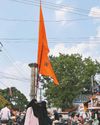The Sabarimala and Franco fiascos are emblematic of the patriarchy’s resistance to women’s rights.

One night in December 2014, a woman journalist, with her two small children, was asked to step down from the state-run KSRTC bus that was carrying pilgrims to Sabarimala. The driver and the conductor had divined that the purity of the bus carrying pilgrims would be desecrated if a woman of menstruating age was allowed to ride it. This triggered the ‘Catch the Pampa Bus’ protest that urged women to board the KSRTC Pampa special bus. The police arrested the protestors before they could get on, and they were let off only late at night. “This is body politics of the worst kind. Soon they will tell menstruating women not to walk on the public road to Pampa. Religion and culture are being used to subjugate and control us women in this democratic state. The system is actively ensuring that our mobility and visibility are controlled. This is gender-based discrimination and it is a clear violation of our rights,” activist Jolly Chirayath told this reporter at that time.
And even after the Supreme Court pronounced its historic verdict on September 28 this year, which lifted the ban on women between the ages of 10 and 50 years entering Sabarimala temple, a great mob of protestors blocked all women from entering the temple during the five days from October 17 to 22, when it had opened for the first time after the judgment. Though the state government had assured young woman devotees wishing to go to Sabarimala of full police protection, no woman between the ages of 10 and 50 was able to enter. In fact, women of all ages were questioned, and woman journalists who were reporting even 20 kilometres away from the temple were blocked by the Ayyappa Dharma Sena and other senas. More than 10 women in the age group attempted to worship at the temple, but were turned away by the protestors; some women from rural areas of other states, unaware of the protests, were literally chased downhill.
Denne historien er fra November 05, 2018-utgaven av Outlook.
Start din 7-dagers gratis prøveperiode på Magzter GOLD for å få tilgang til tusenvis av utvalgte premiumhistorier og 9000+ magasiner og aviser.
Allerede abonnent ? Logg på
Denne historien er fra November 05, 2018-utgaven av Outlook.
Start din 7-dagers gratis prøveperiode på Magzter GOLD for å få tilgang til tusenvis av utvalgte premiumhistorier og 9000+ magasiner og aviser.
Allerede abonnent? Logg på

Trump's White House 'Waapsi'
Donald Trump's victory in the US presidential election may very well mean an end to democracy in the near future

IMT Ghaziabad hosted its Annual Convocation Ceremony for the Class of 2024
Shri Suresh Narayanan, Chairman Managing Director of Nestlé India Limited, congratulated and motivated graduates at IMT Ghaziabad's Convocation 2024

Identity and 'Infiltrators'
The Jharkhand Assembly election has emerged as a high-stakes political contest, with the battle for power intensifying between key players in the state.

Beyond Deadlines
Bibek Debroy could engage with even those who were not aligned with his politics or economics

Portraying Absence
Exhibits at a group art show in Kolkata examine existence in the absence

Of Rivers, Jungles and Mountains
In Adivasi poetry, everything breathes, everything is alive and nothing is inferior to humans

Hemant Versus Himanta
Himanta Biswa Sarma brings his hate bandwagon to Jharkhand to rattle Hemant Soren’s tribal identity politics

A Smouldering Wasteland
As Jharkhand goes to the polls, people living in and around Jharia coalfield have just one request for the administration—a life free from smoke, fear and danger for their children

Search for a Narrative
By demanding a separate Sarna Code for the tribals, Hemant Soren has offered the larger issue of tribal identity before the voters

The Historic Bonhomie
While the BJP Is trying to invoke the trope of Bangladeshi infiltrators”, the ground reality paints a different picture pertaining to the historical significance of Muslim-Adivasi camaraderie